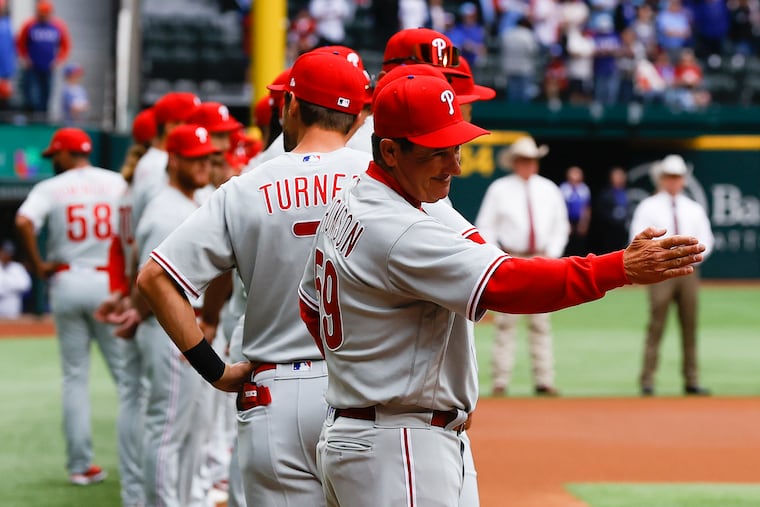Rob Thomson wants the Phillies to get off to a strong start. He has a few ideas on how to do it.
Thomson sees some areas they can improve on to try to avoid the slow starts they’ve had over the past two seasons.

The Phillies have taken a laborious route to the playoffs for the past two seasons. In 2022, they clinched the third wild-card spot and rode it all the way to the World Series. In 2023, they clinched the first wild-card spot and rode it to the National League Championship Series.
Neither of those routes had to be that hard, and both were caused in large part by slow starts. The 2022 Phillies went 11-11 in April, and 10-18 in May, before Rob Thomson replaced Joe Girardi as interim manager on June 3. The 2023 Phillies — with expectations riding high coming off an improbable World Series run — started their season with four straight losses, and were 25-30 on June 1.
» READ MORE: The Phillies run counter to baseball’s new normal. And it remains key to their success in 2024.
Thomson would like 2024 to be different. He concedes that there were many reasons for that slow start in 2023. Bryce Harper did not play until May after undergoing Tommy John elbow surgery. Ranger Suárez missed just more than a month’s worth of starts with a left elbow strain. Rhys Hoskins suffered a torn ACL at the end of spring training, and the four Phillies position players who participated in the World Baseball Classic didn’t get as many at-bats as they would have in a normal spring training.
Nevertheless, Thomson would like to attack this head-on. And he has begun brainstorming some strategies to do that. He sees some areas that the Phillies can improve on, particularly in spring training. These wouldn’t be radical changes, but rather an added emphasis on some things the Phillies were already doing.
“I think the first thing is at-bats,” Thomson said. “Trea [Turner], [Kyle] Schwarber, J.T. [Realmuto], will get more at-bats than they did last year, because they’re not going to the WBC. But do we need to get them more at-bats during spring training games? Send them over to the complex and get them player development at-bats when they’re not playing? We’ve done that before, but are we doing it enough?
“During big league games, they’re allowed to go across to the complex and play in those games. Just to get at-bats. They don’t even have to play the field — they can get an at-bat every inning if they want. And now we have this Trajekt [pitching] machine, they can get at-bats there, too.”
Another area Thomson has identified is in the work the relievers do during spring training.
“It’s making sure that all of our relievers, for the most part, check certain boxes,” Thomson said. “They all do back-to-back games in spring training. They all go one-plus [inning]. They all have a dirty inning where they come in with runners on base. You try to do that in major league spring training games, and not necessarily minor league games because there is a lot less adrenaline.”
He plans to run the last five to seven games of spring training just like a regular-season game.
“These are the same ideas [as previous spring trainings], but we’ll be really [homing] in on them and paying attention a little bit more,” Thomson said. “And then really taking the last five or seven games, whatever it is, and ramping up the volume and saying, ‘Let’s go.’ We’re sort of mixing and matching, using relievers in the roles that they’re probably going to be used in during the regular season, just to get them accustomed to it.
» READ MORE: Phillies prospect update: OF Tjayy Walton works to lift the ball; Devin Saltiban learns to play shortstop
“So there’s all of these little things that I’m thinking about just to try and help us get off to a pretty good start. I hope I don’t sound like I’m not creating panic — or excuses — but there are things that I think that we can improve and help these guys get off to a little better start.”
The Braves are still a juggernaut. They spent their offseason retooling their bullpen, and also traded for outfielder Jarred Kelenic and pitcher Chris Sale. The Mets signed outfielder Harrison Bader, pitchers Sean Manaea and Luis Severino, and hired David Stearns to lead their front office. Winning the National League East isn’t going to get easier.
Despite a quiet offseason, the Phillies have the talent to compete with those teams. The trick will be getting more consistent production from Game 1 to 162.
“We’ve proven you don’t have to [win the division to make a deep playoff run],” Thomson said. “But that is a slippery slope. Because if you get off to a little bit better spot ... We were .500 in March and April, so it’s not like we were terrible. But in May? We weren’t good at all. And then you’re playing catch-up. And that’s a lot of energy being used. Whereas if you get off to a better start, there is not as much anxiety in August and September.
“I don’t want people to think — and players wouldn’t think this — that it’s OK to win the wild card, and it’s easy to win the wild card, and you’re going to go further by winning the wild card. Because if you’re thinking that, you should shoot for the wild card because those division winners the last couple of years have been beaten out early, you won’t make the playoffs. There’s a good chance you won’t make the playoffs. We’re looking to win the division. And to do that, we have to play solid every month out of the year.”
» READ MORE: Thomson’s already answering questions about Kyle Schwarber in the leadoff spot